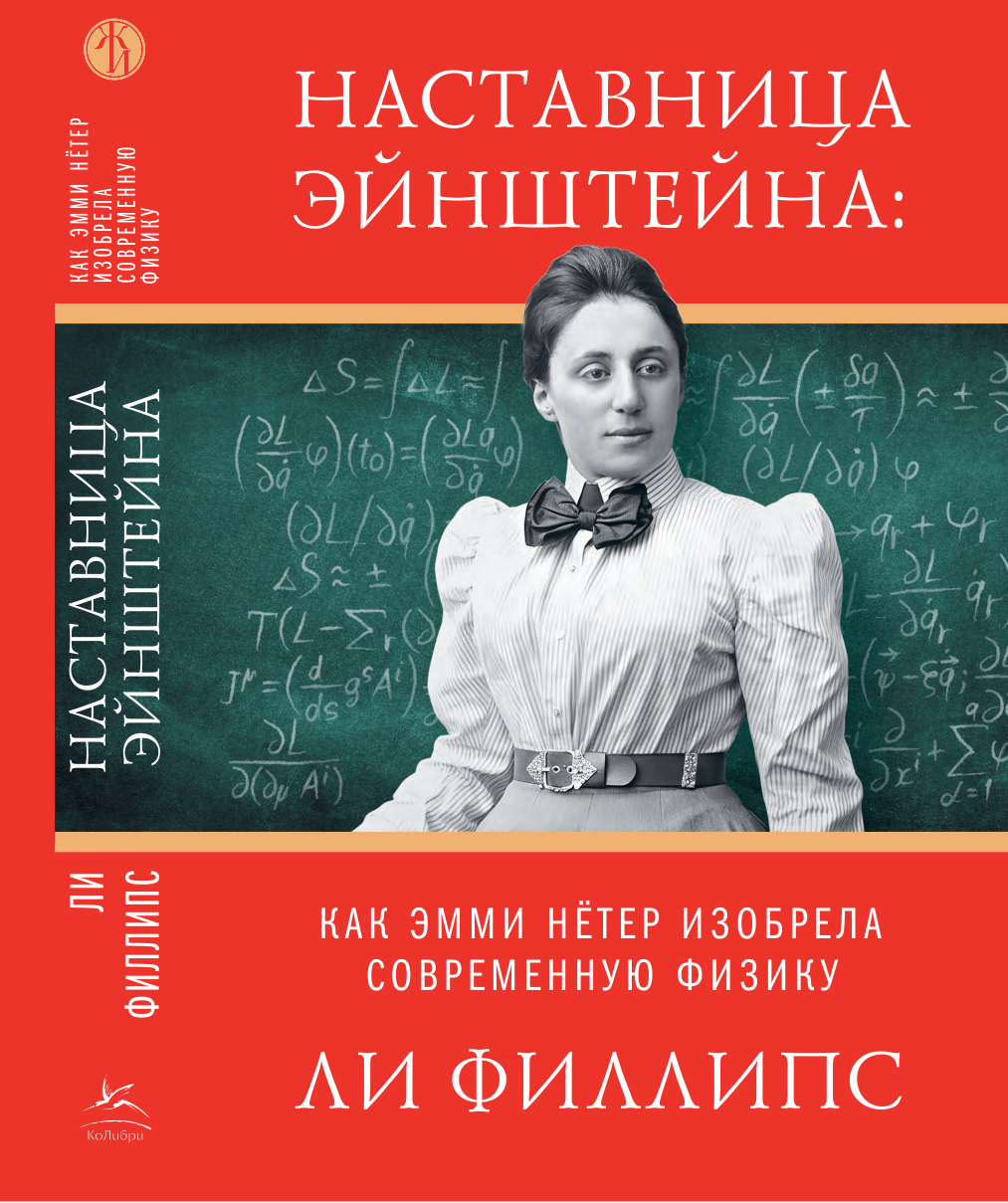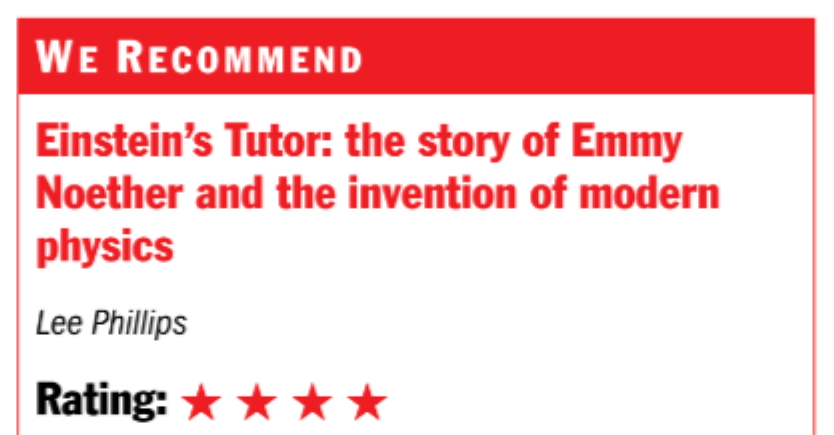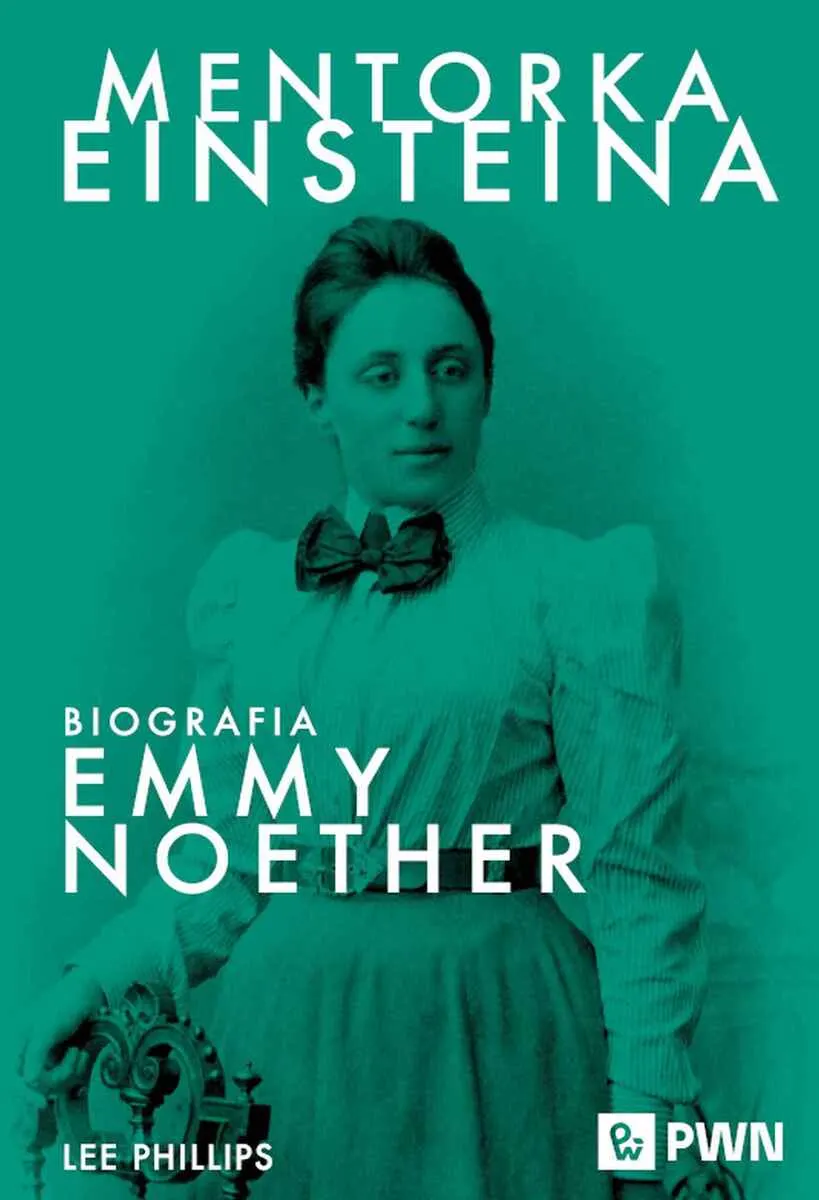Einstein’s Tutor: The Story of Emmy Noether and the Invention of
Modern Physics
Lee Phillips

Science: “Phillips’s writing shines…everyone will learn something new from this book.”
Wall Street Journal: “captures the invigorating atmosphere of mathematics surrounding Noether in her time.”
Prospect: “extremely well-written”
Times Lit. Supp.: “His detective work reveals a complicated story…full of lessons for the international scientific community today…a reminder of the humanity of most scientists and mathematicians”.
Physics World: “Phillips paints an especially vivid picture of Noether’s life”
Physics Education: “Fascinating”
Nature: Included in “best science picks”.
American Scientist: “Complex ideas from mathematics and science are presented using intuitive and conceptual examples…Some of the most elegant science communication in the book unfolds as Phillips walks us through what symmetry means in Noether’s theorem.”
Inter Disciplina: “an essential book”.
Publishers Weekly: “gives an overlooked innovator her due.”
The Next Big Idea Club: A “must read” book.
Library Journal: Listed as a top title: “An intriguing title capturing the work of a brilliant mathematician”.
Buy now.
News
20/4/2025 14:39 Emmy Noether: Emmy Noether’s life and the importance of her eponymous theorem in the history of physics, based on my book
Einstein’s Tutor. (In Dutch.)
9/4/2025 19:07 Hidden Genius: A review of
Einstein’s Tutor in
American Scientist: “Complex ideas from mathematics and science are presented using intuitive and conceptual examples, and he makes few assumptions about his reader’s prior mathematical knowledge. Some of the most elegant science communication in the book unfolds as Phillips walks us through what symmetry means in Noether’s theorem.”
05/03/2025 08:03 Japanese Translation of Einstein’s Tutor: Today my publisher signed a contract with Misuzu Shobo of Tokyo to distribute a Japanese edition of my book about Emmy Noether and her eponymous theorem. Other translations on the way are Simplified Chinese, Polish, and Russian.
13/12/2024 15:15 Einstein’s Tutor by Lee Phillips: I referenced the excellent
Einstein’s War by Matthew Stanley several times in
my book, so was pleased to see this appreciative review in the
Times Literary Supplement by Stanley of
Einstein’s Tutor.
6/12/2024 9:50 My interview on TalkRadio about “Einstein’s Tutor”: On December 5
th, 2024, I talked with Paul Ross for a quarter hour about my
book on “TalkRadio”, a UK radio station. The host was charming and gracious and had clearly read the book. Unfortunately they keep the audio archives up for only about a week.
14/9/2024 8:39 Einstein’s Tutor: A review of my book in
Science: “Phillips’s writing shines in his exhaustively researched historical narrative…Accessible to both nonscientists and trained physicists…ultimately, everyone will learn something new from this book.”
10/9/2024 15:24 Einstein’s Tutor sold out on Amazon: My book about Emmy Noether and the emergence of modern physics went on sale today. Shortly after midnight, Amazon reported the book as out of stock: the pre-orders wiped out their inventory.
31/08/2024 12:10 Three Translations for Einstein’s Tutor: As of today we have contracts to translate the book into Russian (with distribution in Russia and the
CIS), Polish (with worldwide distribution), and Simplified Chinese (with distribution in Mainland China).
9/7/2024 16:26 25% off Einstein’s Tutor: Get a discount if you preorder now at the publisher’s site. Exclusions apply. Offer ends 07/17/2024.
Emmy Noether
She was a mathematical genius born into a society where women were not permitted to study or teach in universities: Germany at the turn of the 20th century. Consumed with a passion for math, she audited courses, then enrolled when the law changed to allow it, getting her PhD in 1907. She was not allowed to teach officially until the end of WWI, when she finally became a professor. Noether, a Jew, was removed from that job by the Nazis in 1933 and escaped to the United States.
Noether was one of the most important mathematicians of the 20th century, remaking and inventing entire fields of mathematics. According to current research mathematicians, her methods of thinking and teaching permeate the entire discipline.
Noether’s Theorem
Noether gave crucial assistance to Albert Einstein, guiding him to the completion of his General Theory of Relativity. This led to her publication in 1918 of what we now call Noether’s Theorem. This result, relating symmetries with conservation laws, provides the modern definition of energy and explains why energy is not conserved in the universe as a whole. Many scientists describe it as the most important result in all of theoretical physics. In the same work Noether invented the concept of the gauge theory; she also created the modern formulation of representation theory. The Standard Model, the current theory of the elementary particles, is an application of these ideas. Noether’s work, therefore, provides the foundation for most of fundamental modern physics.
The Book
Einstein’s Tutor tells the story of Emmy Noether’s life, describes the role of her work in the history of science, and explains why you haven’t heard of her. It’s aimed at a general audience and contains only two tiny equations, both of which you’ve seen before.
Using original research, I describe details of Noether’s life and death that have never appeared before, and trace the passage of the ideas in her Theorem from its creation down to the present day, where it’s escaped from physics and is being applied in biology, economics, quantum computing, and more.
Einstein’s Tutor was released on September 10th, 2024. It’s available at all decent bookstores and online retailers, including Amazon.
More Reading
A short review on Noether’s theorems, gauge symmetries and boundary terms: This widely-cited paper came out in 2016 but I just found out about it (too late to mention it in the book):
“This review is dedicated to some modern applications of the remarkable paper written in 1918 by E. Noether. [I]n a single paper, Noether discovered the crucial relation between symmetries and conserved charges as well as the impact of gauge symmetries on the equations of motion. Almost a century has gone since the publication of this work and its applications have permeated modern physics. Our focus will be on some examples that have appeared recently in the literature. This review is aim[ed] at students, not researchers.”
Also at https://arxiv.org/abs/1601.03616.
“Jewish Mathematics”?: This subtly written and argued essay by James Propp makes some points similar to ones in
Einstein’s Tutor: notions of racial differences in styles of mathematical thought may be quaint and curious when Felix Klein expounds them, but they are deadly ideas.
The Hasse - Noether Correspondence 1925 -1935: “English Translation with Extensive Commentary…Detailed comments clarify the content of the letters in their historical content…Can be used as an introduction to modern class field theory… Illustrates the evolution of mathematical concepts and structures”.
Physics from Symmetry: An interesting textbook “that derives the fundamental theories of physics from symmetry.” The author’s story and more about the book at http://physicsfromsymmetry.com/.
Grace Chisholm Young: gender and mathematics around 1900: Contains an interesting observation that pure mathematics may be less threatening to men than empirical sciences, and therefore a more welcoming field for women. Also notes that there were more female mathematicians, proportionally, in 1900 than in 1960.
Arch and scaffold: How Einstein found his field equations: “In his later years, Einstein often claimed that he had obtained the field equations of general relativity by choosing the mathematically most natural candidate. His writings during the period in which he developed general relativity tell a different story.”
Math teacher on Emmy Noether’s erasure from math history: In 2 tweets, David Wees recounts how his abstract alegebra classes scrubbed mention of EN from history of the subject: “I took two courses on rings, fields, and algebras and never learned anything about Emmy Noether”; and a follow-up tweet: “She was erased from my the history included in my abstract algebra courses at UBC. It was all Galois & Abel.”
The Noether Theorems: ‘good and at times reads like a spy novel: “Who Knew What, and When”.’ According to a comment at https://thonyc.wordpress.com/2010/03/24/emmy-and-the-habilitation/
The Symbolic Universe: Geometry and Physics 1890-1930: “Physics was transformed between 1890 and 1930…examines the reception of Einstein’s theory of special relativity…describes Einstein’s path to formulating general relativity…provides the first detailed account of Emmy Noether’s work on physics.”

 I’ve just received the cover of the Russian translation of Einstein’s Tutor.
I’ve just received the cover of the Russian translation of Einstein’s Tutor.



